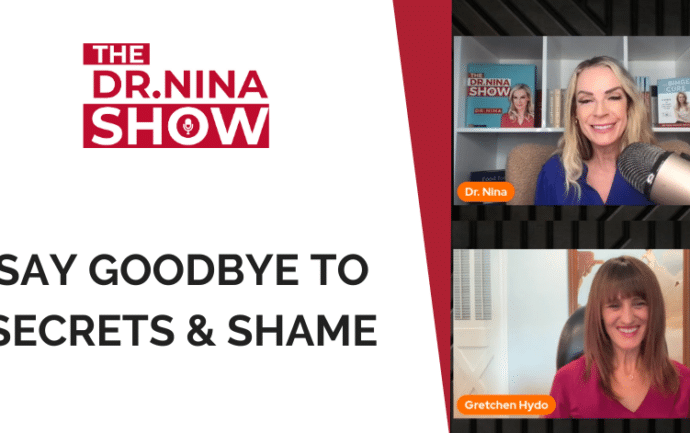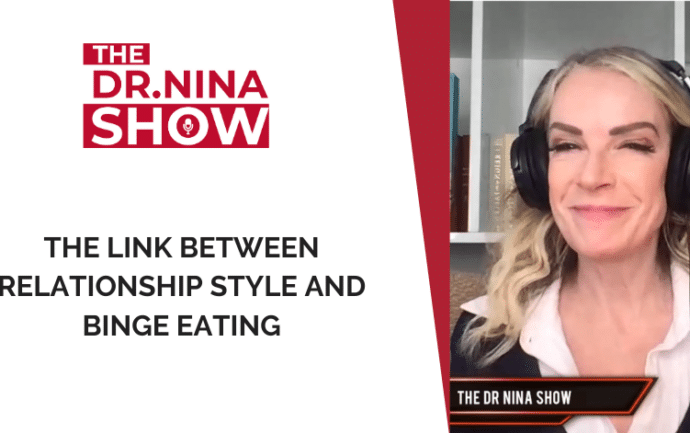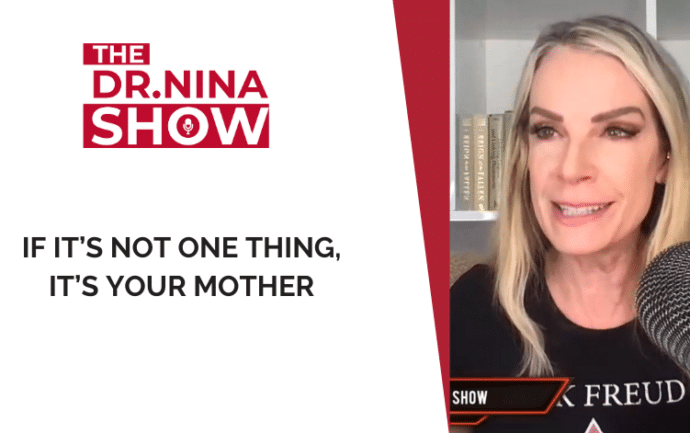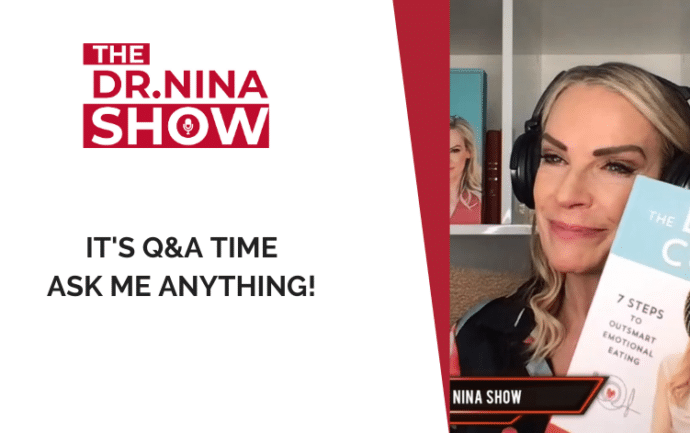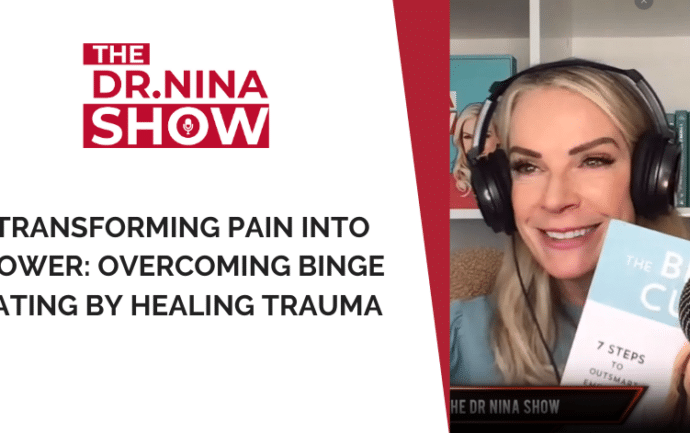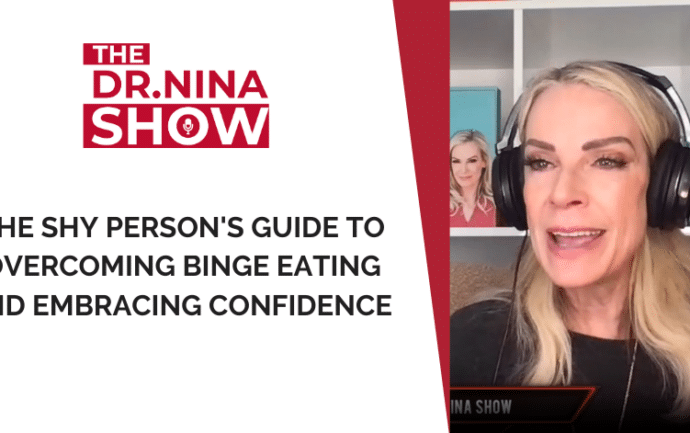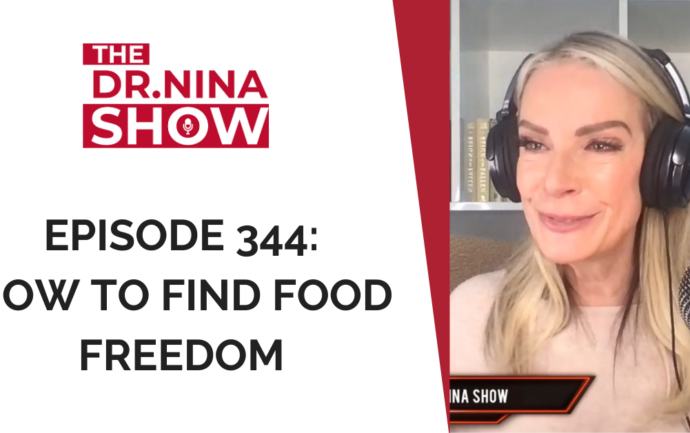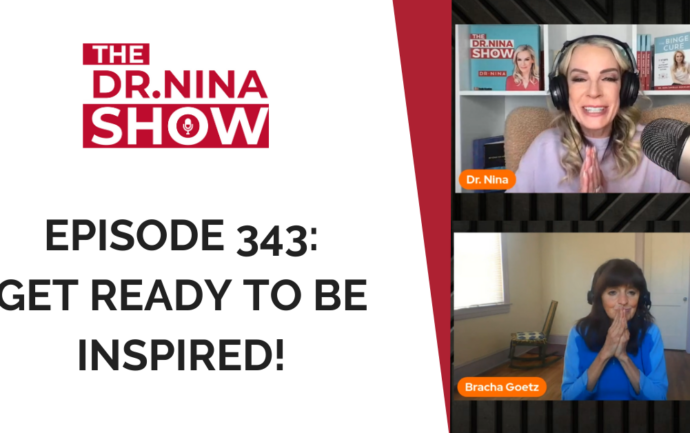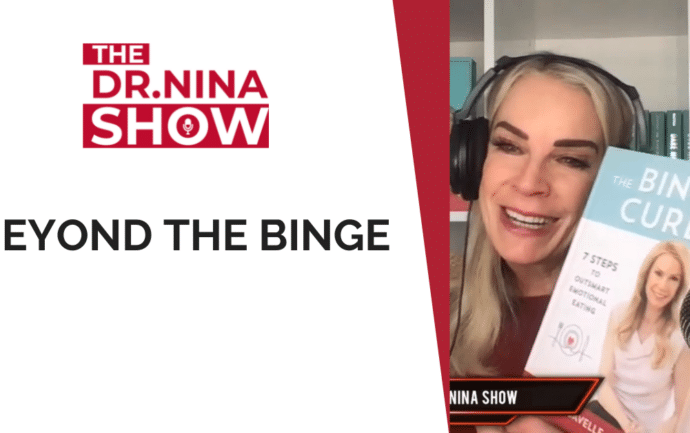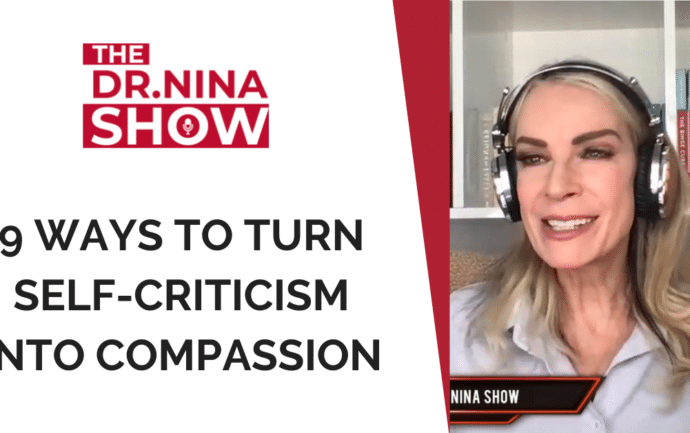Dr. Nina Savelle-Rocklin
How To Stop Binge Eating [Podcast]
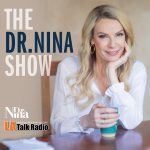
Table of Contents
- Summary
- Transcript
- What is the process of change and how does it help you stop binge eating before it happen?
- I don't believe in recovery from eating disorder
- Being triggered by food
- What is the replacement for feeling empty?
- Let's hear from Karlygash and Josh
- Eating addiction as opposed to food addiction
- What's the difference between guilt and shame?
- Using the VARY technique
- Let's talk about my co-host of the Binge-Free Babes Program, Kelly Gunter
- Fear of happiness can be a major obstacle to weight loss
- Reading about loneliness from my book, The Binge Cure
- Be curious and not critical to yourself
- What's the point of feeling your feelings?
Summary
I discuss how to stop binge eating and what to do instead. I talk about the process of change when it comes to stopping binge eating. I help Karlygash understand the triggers to her bingeing. I answer Josh's question about how unconscious guilt leads to food issues. I also explore the connection between loneliness and food, and give steps on how to change your relationship with food by changing your relationship with yourself!
Transcript
You're listening to the Dr. Nina show with Dr. Nina Savelle Rocklin only on La talk radio.
Dr. Nina: Hi there. Welcome to the Dr. Nina Show here on La Talk Radio. I'm your host, Dr. Nina Savelle-Rocklin. And I am here to help you break free from body shame, binging and diets that don't work. I want you to wake up and think about your day, not your diet.
And if you love the show, please take a moment to rate it or even leave a comment or review in Apple Podcasts. Just look for the Dr. Nina show on La talk radio. And go give it some stars, I would really appreciate it. And if you would like to join me today, the number is 323-203-0815. That is 323-203-0815.
I would love to hear what's on your mind. What is weighing on you? Because the real problem with binging stress, eating any kind of emotional eating, the real problem is not food. It's not what you're eating. That's the problem. It's what's eating at you.
So I see Josh on Instagram has a question. Hold that question, Josh. Because I had another question.
From someone who wrote,
“I am always able to figure out why I binged after it happened. But how do I learn to stop before? And what is the replacement for feeling empty?”
Those are all excellent questions.
What is the process of change and how does it help you stop binge eating before it happen?
So first, I just want to go over the process of change. The process of change is a process like I was kind of saying before I started the show. So the first step is you say “Oh, I'm a food addict, I have no willpower. I have no control. There's something wrong with me and you feel such intense and horrible shame.”
The second step is you realize, “Oh, something is going on. It's not about willpower. It's not about control. It's but I don't know what it is until after I sit down and figure it out with somebody else with a therapist or in a group.”
The third step is you figure it out on your own afterwards. And I think that's where this person is she can figure it out afterwards. “Oh, that's why I did that.”
The next step is, you identify it beforehand, you go, “Oh, I know. I want to go eat whatever. But I don't care. I'm gonna do it anyway. I can't do I just, I'm gonna do it anyway.”
The next step after that, see how many steps there are. The next step after that is, “I know why I want to eat. I know I want to binge, I know what's going on. But you know what, I'm not going to use food. If I'm turning to food, I'm turning away from something else. I know what that is. And I am going to respond, respond to myself differently.”
How? I'm going to get to that in a second.
The last step is that's not the last step. By the way, the last step is not “No, I'm going to do something differently.” The last step is “It doesn't even occur to me to go into the kitchen or to drive through or call Postmates. It doesn't even occur to me, because I'm so good at responding to what comes up without using food that it doesn't even cross my mind.”
That's liberation.
I don't believe in recovery from eating disorder
As I was saying, right before we officially started, I don't believe in recovery, recovery from binge eating or recovery from any kind of eating disorder, oh, recovery, it's something you're in, you're always in, you're in recovery.
No liberation is you've dealt with it, you've changed your way of relating to yourself, you are different to yourself, and therefore you're not food is not a problem. And you can eat what you want. Without all the stress and the worry and the fear of gaining weight or the wish to lose weight or all of that. That's behind you. That's in the rearview mirror. That's liberation, and I want you all to have liberation, not be in recovery.
Okay, so that's the process of change.
As far as how do you figure it out beforehand? That is where my food mood formula comes in. If you don't have my book, where I really outline that in detail, you can also get my guide on my website, just go to drninainc.com. And get your copy of the food mood formula workbook. But you can also look at it in-depth, my book, shameless self-promotion, here's my book. But I'm going to tell you what it is.
Anyway, I know a lot of you know what it is, doesn't hurt to hear it often.
Being triggered by food
So if you don't know what's going on, because we're so quick to go zoom, right to food. We don't, even know we're being triggered. We think we're being triggered by food, often. That's why it's so difficult. The triggers are often hidden.
But you want to think about this. If you're turning to smooth, creamy foods like ice cream, that's a sign that you need comfort.
If you're eating bulky foods like bread, or pasta, or pizza, or muffins or cake, those things it's kind of fill the void that is connected with loneliness, emptiness, some kind of internal void that gets symbolically filled with food.
Third category is anything crunchy, if it's, you know, if you're all about Doritos, or any kind of tortilla chips are things like that, or pretzels or anything with a crunch that is associated with anger, frustration, irritation, annoyance, anger, rage, these are all forms of anger. And then you what you want to do is find new ways of expressing that anger without turning it towards yourself for eating or without by the food that you're actually eating.
So to identify what's going on before that, use my food mood formula. How I developed it was in 20 years of exclusively treating people who have struggled with eating disorders, in my clinical private practice. I only see people who struggle with eating disorders with one exception, but her daughter had an eating disorder.
So I started noticing that when people were saying, “Oh, I need, you know, I just couldn't stop eating ice cream,” what they really needed was comfort. When they were eating all kinds of filling bulky foods, what they really were doing was symbolically filling a void, and so on, you know.
Chocolate, chocolate, people said, Well, what about chocolate? Come on? Where does chocolate fit in the food mood formula? Well, chocolate is usually you there have it filled with some creamy filling, which would go to smooth and creamy, or it has nuts in it. So that goes to the anger category. Or it is like dark chocolate was also crunchy, goes to that anger category.
And if none of those fit, well, I want you to ask yourself are not having chocolate or having candy. Maybe you're missing some sweetness in your life. So if chocolates or candy are your go-to ask yourself about that. What sweetness Are you missing in your life?
So that's how you start to identify what's going on beforehand, just by the food that you are choosing to binge on or stress eat over.
What is the replacement for feeling empty?
And the next part of the question was what is the replacement for feeling empty? Great question. Difficult question.
It's hard to get in touch with those empty spaces within us. It is painful to realize there is a void. And so you got to go through some difficult self-reflection. And ask yourself, what is the void?
It's usually either something to do with people, either not having a partner not having enough friends or you have a partner but it's you don't have a satisfying relationship. Or it's some other dissatisfaction in life.
I'm sorry, I'm just reading what Josh is writing. Hold that thought, Josh.
Some other dissatisfaction in life, maybe you're not doing the job that you wish that you could do. Maybe you don't have kids and you really want them. Maybe you have kids, but they left you're an empty nester, there can be so many different reasons for that void. And depending on what that reason is. That's how you sort of fill the void.
So you can't do anything about the fact that your kids are in college, for example, but you can mourn the fact that they're gone and, and heal. The fact that they're gone and come to a place where the situation hasn't changed. But you feel differently about the situation where you can say, “Okay, they are, you know, they're not home anymore, my house is empty. But I don't feel so bad about it. I'm happy that my children have launched and they're out living their lives.”
Remind me that I'm saying this in about four years when my last one leaves.
Okay? If you are having dissatisfaction with a partner well, and it leaves you empty, there's no worse emptiness in my mind, there's no worse loneliness than loneliness when you're with someone else, or when you're with other people, that is a profound loneliness.
And you've got to figure out, well, can it be filled with this person? Do you need other things to do those other people that can kind of fill the void, and you have other friends or other people that you have things in common with?
So there's no one answer because everybody is an individual. And because we're individuals, we each have a different way of dealing with loneliness. And by the way, loneliness is often mistaken for boredom. People say, “Oh, I, I just eat when I'm bored.”
Well, boredom is like an umbrella emotion. It kind of covers up other feelings. We say we're bored. Boredom is “I need something to do.” Yeah, you want to do something? There's stuff to do.
Let's hear from Karlygash and Josh
Hi caller.
Hello? Caller. I don't hear you. Sam. Um,
I don't hear I don't hear anything. Sam. Are you there? Hung up.
Karlygash, did you have problem getting through?
She's on Instagram.
Karlygash: Hello.
Dr. Nina: Oh, there you are. Hi Karlygash, welcome to the show. I don't hear you. All right. Sam, we're having some problems because…
Hello.
She's not hearing me.
Sam says there's something on your end, Karlygash. I don't know what's going on.
But you can text, you can drop the comment in or try… you can't get through. All right, you can leave a… maybe try leaving a comment in Instagram.
I just want to say what? Let's see. Josh was saying
“Food isn't an addiction like other addictions.”
Well, it's interesting because, a couple of years ago, I co-edited a book called Beyond the primal addiction with my mentor, the amazing Dr. Selman Akhtar. It was about all, it was called Beyond the primal addiction, but it was all addictions, other than we chose not to do drug addiction or alcohol addiction or anything like that, but it was addictions, food, even though of course, you know, I don't believe in food addiction, but we'll get to that, you know, food, shopping, internet, sex, gambling, you know, all these addictions. They all have one thing in common.
They are ways of coping. And even if you read Lance Dodes' work on alcohol addiction, and even drug addiction, there is a strong psychological component to it. It is not just a physiological addiction.
So people are not addicted to the substance of food. A lot of times people say, “but what about that research study that showed that rats prefer sugar over cocaine? Doesn't that prove that sugar is more addictive than cocaine?” Or I think it was actually heroin. Maybe it was both?
Well, the truth is that first of all, rats are not motivated to get high. Rats don't care about heroin. They don't care about cocaine. They care about food. They care about survival. And sugar is food and sugar is survival. And that is why rats will go to sugar every time. And by the way, those rats were starved before they were allowed to choose between heroin and sugar.
So if we're going to use the idea of addiction, which again, I don't like it. I find it pejorative and somehow shaming but if we're going to use that word, let's talk about an eating addiction as opposed to a food addiction.
Eating addiction as opposed to food addiction
A food addiction means you're physiologically addicted to the substance of whatever it is you're eating. An eating addiction is you're using eating of, of any kind of food, to resolve something emotional, that you're addicted to eating as a way of coping.
By the way, there was a study that set out to prove food addiction. So interesting.
They set out to prove that food addiction was a thing, a real thing. And what they did was they got all these people, research subjects, and they told them, “Hey, we want you to eat your forbidden food. We want you to eat your forbidden foods.”
And their thought was, well, these people are going to eat their forbidden foods, and they're not gonna be able to stop because they're addicted to them. You know what happened, something really interesting happened. The people in the study actually ate less of the forbidden foods.
Now, why is this because of the anticipation of deprivation because of the psychology of it. When you can't eat something, you're gonna want it more. And then you feel addicted.
When you are told, “Hey, eat as much as you want of your forbidden foods.” That was hard to say. You can decide whether you want it and how much of it you're going to have that pointed out the psychological aspect of food issues.
And so they set out to prove that food addiction was a thing and they actually ended up disproving it. Really interesting. So Josh, yes, thank you for bringing up that point. Absolutely.
Food addiction is a way, I hate the word addiction but, it's a way of coping if you're turning to food, you are turning away from something else. Why it gets tricky is you may not know what that is.
We get so good at coping that we don't even know we're being triggered. Things can happen and can trigger us but before that awareness that we're upset even reaches our conscious mind, our conscious awareness. Boom. Oh, let me call Postmates.
Karlygash, I know you're unable to get through. Do you want to post a question or something like that? In Instagram?
Also, Josh, I think you had asked something about guilt.
What's the difference between guilt and shame?
So we'll talk about guilt and shame. So guilt is when we feel guilty about something we've either done or something that we think we should do but we haven't done. Guilt is, “Oh, I really feel bad that I didn't do that. I really feel bad that I did that.” So guilt is…
Hello caller.
Hello.
Welcome to the show. Can you hear me?
Karlygash: Hello?
Dr. Nina: Hello. Karlygash, can you hear me?
Alright, Sam, she's not hearing me. I hear her but for some reason, she's not hearing me. I don't know what's going on Karlagash. I can hear you perfectly so I don't know why you're not hearing me. I'm sorry about that.
Alright, so guilt is, “Oh, I feel bad that I didn't do that I feel bad that I…”
Food example. So Thanksgiving is coming up here in…
Sam, Karlygash is saying she called from a different number and the same thing happened so maybe there's something on our end where people can't hear. Hear me. Okay, Sam's gonna see what he can do. Hopefully, we'll get it resolved. But if not, Karlygash, try again in a minute.
Don't you love technology? Here we went from doing the show from a studio in LA to now we're just somehow doing it from my House, from the studio, through Instagram. It's all good, but it gets a little bit crazy sometimes.
Okay. So guilt is about like, Thanksgiving is coming up. A lot of people overeat on Thanksgiving. And if you don't have an issue with food, you say, “Oh, I feel so bad, I feel a little guilty I ate too much,” or “Oh, I feel bad that I ate too much.”
But shame is feeling bad about yourself. So shame sounds like, “What's wrong with me that I ate that? What's wrong with me? There's something wrong with me.”
Guilt is about something you do or don't do. And shame is about who you are.
Karlygash: Hi Dr. Nina, I'm calling from the second number and I'm not hearing you still.
Dr. Nina: You're still not hearing me? Okay. I don't know. All right. She's still not hearing me. I don't know why that is. Sorry, Karlygash. Um, maybe it's some issue on our end, but I don't know. Sam's on the case. I could hear you perfectly so. Huh. All right. He'll figure it out. In the meantime, Karlygash, you want to leave me a comment in Instagram and let me know what it is that is on your mind?
What is unconscious guilt?
Okay, so unconscious guilt. I think, Josh, you had asked about unconscious guilt? So unconscious guilt is when we don't consciously feel guilty, but we feel as if we don't deserve things. So that we feel bad about ourselves.
When we feel like we don't deserve things. We feel bad when we get things. And some of that is cultural. We're told like…
Let's see. Okay, Karlygash says, “I noticed again, I'm living my life in fear and being triggered almost all the time. I guess I need a little encouragement to keep going and investigate.” Well, this might actually go along with guilt.
Karlygash has been calling the show for a while. And what we know about Karlygash, your history, is that you come from a family in it in a different country, in which, you know, they are really struggling. And the idea is, if you do well when the rest of your family in Kazakhstan is struggling, there could be consciously, it's good for you, you're doing well, unconsciously it's, oh, you're breaking the family rule.
You're breaking the family rule, you're doing well. And that guilt can then be converted into guilt over food. So instead of, “Oh, I feel so guilty, because I'm doing so well. And my family is back in Kazakhstan and I'm living the life in America.” You don't think that, you think, “Oh, I feel so guilty for eating this or that.” So you have an inner bully?
I think that you've heard me often say, be curious, not critical. So Karlygash, do you notice anything that's going on in your life before you start having these bullying thoughts? That would be an interesting place to start.
Because sometimes the number one, obstacle to success is, drumroll, happiness. Fear of happiness, and consciously that sounds ludicrous. Why would you be afraid of happiness? Of course, you want to be happy. You want to be at your best wage, you want to be living your best life, you want to be happy, you want to you want whatever it is, you know.
Of course, you do, consciously. But then an unconscious hidden part of you can say, “oh, no, no, no, no. That's not okay.” Many, many cultural prohibitions to that, not just your family, Karlygash, what do we say? “Oh, it's um, you know, it's too good to be true. The other shoes gonna drop.” By the way, what is that other shoe and why is it gonna drop? From where? But you get the idea.
Okay, Karlygash is saying, “I usually have a leap of success, and then the bullying voice kicks in.” So this really goes to that unconscious guilt.
Josh, Karlygash is, unbeknownst to her, absolutely answering your question about unconscious guilt. So consciously you have this leap of success, yay for you. And then another part of you, that has a prohibition against success. You're not supposed to be successful. You're supposed to suffer. Too good to be true. How can you be successful when your family is suffering. All this kind of stuff.
Also, some people with certain religious backgrounds, almost think that sometimes it can be, it's like, better to suffer. That somehow there's something sinful about enjoying your life too much. So all of these prohibitions can be at work or some of them.
And so Karlygash, you have to remind yourself that you're allowed to be successful. You work hard, you are a good person. You deserve to have goodness in your life. This is what you have to absolutely remember. You get to feel good about your life.
Using the VARY technique
So when you use VARY, and by the way, for those of you who are new to the show, when she says the she's VARYing herself using the VARY technique, people said, “well, how do I respond to myself when I'm upset?” And I developed this acronym? I'm a lover of acronyms. So I developed this acronym VARY. V-A-R-Y. You're supposed to vary the way that you respond to yourself instead of turning to food VARY it.
Responding to yourself with words very stands for Validate, Acknowledge and Reassure Yourself.
So Karlygash, of course, I am feeling scared because I got the message that success is is not for me. I got the message that success will make other people jealous, envious, upset with me. I got the message that if I'm successful, I'm not going to be part of the family anymore. And, of course, that's a very hard thing to cope with. That's hard. That's a painful, difficult upsetting state to be in. That's validate and acknowledge and then you reassure yourself.
I'm practicing this. I'm going to allow myself to feel successful. It's going to take time, but I'm going to embrace my success. I'm in America, land of opportunity. I am taking my opportunity, and I'm allowed to have this. I give myself permission to be happy. It is not a setup for failure. It is nothing to be ashamed of.
Right, the Y stands for yourself, Karlygash.
Let's talk about my co-host of the Binge-Free Babes Program, Kelly Gunter
Hey, oh, look who just joined on Instagram. Kelly Gunter. Kelly. Hi, Kelly.
Kelly Gunter is my co-host of the Binge-Free Babes program. The binge-free babes project. She wrote an amazing book called, you have such a pretty face all about her experiences, she lost 243 pounds.
Kelly, try calling the show, we may be having difficulties. But try calling the show and talk about it for yourself. But she lost 243 pounds. Thought she'd be happy. Was she happy? No. Do you know why? Because she never got to what was going on inside her.
She never got to why she was turning to food. She never got to that and she never healed until she did. And now she's healed and healing as we all are. It's a constant process to heal and support ourselves. That doesn't mean being in recovery. That means being human.
So Kelly or anyone else who might want to call him and give you the number again. It is 323-203-0815 we may be having technical difficulties. But give it a try.
Karlygash, did that resonate for you? She's on Instagram. I think so. Yeah.
Fear of happiness can be a major obstacle to weight loss
So isn't it? Isn't it interesting that that fear of happiness can be such a major obstacle to weight loss or anything? She's saying? Yes, absolutely. Yay, good.
Fear of happiness can be such a major obstacle to weight loss, to self-care, to getting to your goals, whether they're your weight loss goals or your life goals, there can be such a terror of, and then what? And the and then what is, you know, things are going to fall apart or people are going to be envious or it can't last, or all of these ideas that we have.
I remember someone once told, one of my patients heard someone said, “Oh, well, you were doing so well, I know, it was only a matter of time before you crashed and burned.” What? This was a parent of one of her parents, by the way. Lovely, right?
But this is the kind of thing that this kind of message we get. And so, of course, when we start to feel good, we can get scared. And by the way, what is one way in which you can avoid feeling “too good.”? What is one way? Never feel too good about your weight.
Always be upset about your appearance. Always be worrying about your weight. If you never feel too good then you know you're not gonna tempt the Gods to destroy you. To take away all the goodness. If you never step into paradise, you can never be kicked out.
So that is something to think about. Food for thought.
Okay, um Kelly, I don't know if you can join me but I would love if you do.
There's something wrong here. I'm trying to wait for an Instagram.
I'm not even sure she's hearing me.
Alright, so any other questions? I am happy to answer anything. Or try to call me or you know, if you're on Instagram, drop a comment.
If not, I'm going to randomly open my book. And I am going to read whatever it is that I wrote.
Reading about loneliness from my book, The Binge Cure
Okay, I'm going to read about loneliness. PAGE 47 for those of you who have the binge cure.
So loneliness, which is often mistaken for boredom. So in the book I talked about Roberta…
Phones are not working right now. Okay, never mind, do not call me. The phones are not working. That means I'm just you're just gonna have to hear from me or drop a comment on Instagram and I will be happy to answer it.
In the meantime, let me talk about loneliness and Roberta.
She had an active social life, but she felt like something was just missing. And she would go to gallery openings.
This was pre-COVID.
She'd go to movies, she'd go to the theater. She did all these things. She was always doing interesting things and going out with people. She was always busy. She would go out like five times a week.
And yet, she would feel like people are just tolerating her. She didn't really feel connected to her friends. She didn't feel like they were with her. She didn't feel a sense of unity with them. And she didn't have a sense that they were enjoying her company. She just thought they were kind of putting up with her, even though these were friends of hers for many years. And so social interactions were just exhausting her.
So the first thing she did when she arrived home from one of these events was head straight out of the kitchen. Also, when she went out she would barely eat anything because she want to eat in front of people. So she did have regular meals and she'd have like a little salad or a little soup or a little something else. And of course, she was starving when she got home.
Hi, Debbie. Glad that you are here with me on Instagram. Please leave a comment. If you have any questions for me. I am happy to answer it. Just found out that the phones at LA Talk Radio are not working right now. So Instagram it is. And I will go on talking about Roberta and loneliness.
“The worst loneliness is when you are feeling alone in the company of other people.”
Dr. Nina
So Roberta felt a profound sense of loneliness, even when she was with other people. I think I mentioned that earlier in the show that, to me, the worst loneliness is when you are feeling alone in the company of other people. That's just so painful.
A state of loneliness means wanting to connect with others. Being in the same room as other people doing things together is not the same as feeling safe, fulfilled, connected by those relationships. So if you experience profound emptiness and disconnection, food is an easy way to symbolically fill up.
It is definitely a solution, momentarily, but it is not a good one. And it is not a lasting one. The solution to loneliness is, one, people but also turning loneliness into solitude. So solitude is about being alone but being with a nice part of yourself. A warm, nurturing, loving part of yourself that shows up for you. An inner voice that's always available to offer understanding and reassurance to you.
And again, as I was saying earlier, loneliness is often mistaken for boredom.
One of the comments I hear most often is something along the lines of, “I wasn't feeling anything emotional. I wasn't feeling anything emotional, I was just bored. I eat when I'm bored.
If you eat when you're bored, maybe you're actually lonely. So the key to stopping boredom is to be active, and productive. Eating is something to do, it is an action, but it doesn't solve the real problem. But when you meet the true need, whether it is loneliness or boredom, you stop using food for comfort and distraction. And the way you achieve solitude, instead of feeling lonely, is to cultivate a really kind part of yourself.
Often, the way we talk to ourselves is super harsh. As an example, someone just the other day said, this person said that they were disgusted. They were disgusted with themselves. They looked in the mirror and they said, “You are disgusting. No one will love you. You are gross. If people knew what you do with food, digging it out the garbage cans, trash cans, stuff like that. They would be so disgusted. They never want to talk to you again. You're disgusting.”
Ouch. Right? And what do you think happened? After this person said this? What do you think they did? They went and ate a bunch more stuff. Why? Why is that?
Because the way that they were talking to themselves, made them feel so bad. That they use food for comfort. If food is the only way that you comfort yourself, if food is the only way that you escape your own mean voice, then you're going to eat. So the most important thing that you can do is cultivate a kind, loving response to yourself.
And by the way, this might seem really difficult but I'm going to bet that you are one way to other people and another way to yourself.
If a friend of yours said, “Hey, I have this issue with food. And you know what, I threw away this cake. And then later after everyone went to bed, I dug it out of the trash can and I ate it. Oh, what's wrong with me?” Would you say to your friend Oh, you are disgusting. I don't even want to talk to you again. I see you in a totally different light. I don't think so. I think you'd have compassion. Right?
Be curious and not critical to yourself
If you would talk to yourself in the way that you talk to other people, you're going to feel so much better. You're going to say something like, “Okay, yes, I waited till everyone went to bed. I dug the rest of the cake out. I stuffed it in my face. Clearly, that is a sign that something is eating at me.
Let me be curious. Let me figure out what that is. Instead of calling myself names, I'm going to be really curious, not critical. And I'm gonna ask myself, Okay, let me use Dr. Nina's food mood formula, cake. Am I filling a void? What are the voids in my life? What would I be thinking about? If I was not thinking about food? What would I be worried about? What would be on my mind?”
Then you go, Well, maybe I'd be upset because this thing happened at work or kind of my husband's driving me crazy. Or my wife's driving me crazy. Or, you know, I just I, you know, or what do I do that? I haven't talked to my brother in two years because we have totally different political affiliations and I miss him and that's a void. That kind of thing.
See, when you ask yourself questions instead of calling yourself names, you know what happens? You can find answers. When you look in the mirror and call yourself disgusting and call yourself all kinds of names and disparage yourself in a vitriolic, horrid way, you just feel bad. And when you feel bad, you're going to use food to feel better.
But when you are curious, Hmm, why did I do that? What's going on with me? What's bothering me? What's upsetting me? Then you can find the answers to that. And you can resolve that directly. You cannot simultaneously be cruel, mean, harsh, critical, and judgmental to yourself and be nice.
No one's ever had the conversation that goes along the lines of “You're disgusting. Oh, but I'm, I'm really here for myself.” No.
So I often say that the work that I do is a psychological exorcism. We have to get these ideas, these ways that we relate to ourselves out of our mind. And you learned how to talk to yourself in that way. You learned in some way. By the way, if you talk to yourself in the second person, if you look in the mirror and say you, like this person did, they said “You're disgusting. You're gross. You this you, you you…” that's hidden. I just disclosed it to he.
He didn't say, “I'm disgusting. I'm I'm Gross.” No, he said “you.”
So one thing you can do is who is talking? Who is that “You” voice? Who does it sound like? Did anyone talk to you that way? Did you hear anyone talk to anyone else that way? Is this anything that is familiar at all? And whether it is or it isn't, try changing it to “I”.
When you say “I” it's hard to be mean to yourself from an “I” place. It's really hard to say I'm disgusting. I'm, see I can't even do it even to demonstrate it. I'm so gross. It's it just it's harder to say. So one practical thing that you can do is switch that “you” to an “I” and even if you find it easy to say it to yourself, then that's not productive. That's only going to make you feel bad. So really cultivating a kind, supportive, generous attitude towards yourself with, you know, be in the judgment-free zone.
So you dug cake out of the trash can. Okay, clearly something is up. Something is bothering you. Something is really upsetting you. You're trying to stuff something down. What is it? Let's be curious about that. Not critical. Let's be interested.
What's the point of feeling your feelings?
Okay. since I can't get calls today, I'm just gonna keep opening my book and reading from it because I know that it will relate to someone. And again, if you're on Instagram with me, drop a question drop a comment. I would love to hear from you.
Oh, here's a good one. What's the point of feeling your feelings? What's the point of feeling your emotions? Now, this is part of a defense mechanism which is a motor protection called intellectualizing.
Alright, let me talk to you about Yasmin.
Yasmin had a horrible boss. Worse than Meryl Streep's character in The Devil Wears Prada. If you saw that movie that is a really bad boss.
Her boss was scornful, insulting, dismissive mean, and unreasonable. Her boss would tell her, that she couldn't do anything right. He criticized her performance. He gave specific instructions on what to do and even if she followed them to the letter, he'd find mistakes.
So one day Yasmin came to me and she said she had a confession. “I have a confession to make.” And she proceeded to tell me everything she'd eaten since our last session. And she was so upset with herself. She was so disgusted. She was mad at herself. She gained weight. She accused herself of being a failure, believing that she couldn't do anything right. And I suggested she was taking the anger she felt towards her boss and turning it on herself. And I said the way you talk to yourself affects the way you feel and the way you feel affects what you eat.
So if you're self-critical, you feel terrible that makes you binge for comfort. What Yasmin said was, “So what? How is realizing that supposed to help me? What am I supposed to do with that information?” So she was being logical, she was going into her head as a way of staying out of her feelings.
To stop that cycle, Yasmin needed to express her feelings about her boss, so she wouldn't turn them on herself. And she looked horrified when I said this. She's like, “I can't do that I'd be fired on the spot.” And I explained that expressing feelings does not mean going to the person who is upsetting you and saying, “Hey, you, you're really upsetting me.” Most of the time, that doesn't work. Often that doesn't work and definitely doesn't work with an unreasonable awful boss.
Expressing your feelings stop you from using food to direct your anger inward.
So expressing feelings does not mean actually telling her boss or for you doesn't mean telling a person, what she thinks of them but you have to process those feelings. You've got to process them, which means speak them, write them, talk to a friend, to get them out. And when you express those feelings, you stop using food to direct your anger inward.
Yasmin had difficulty being angry with her boss. Like she would say, “but you know, he's a boss, and like, yeah, he's hard on me. Yeah, he's a really horrible boss but maybe I'm being too sensitive.” So she easily turned her anger towards herself. She couldn't be mad at him, she could be really mad at herself.
So binging did two things for her. First, it provided comfort, helped her numb her feelings. Second, it gave her a way to express all that bottled-up anger by directing it inward. So instead of saying, my boss is out of control, he is the boss from hell, and I am so upset at how I am being treated. I have no control over this boss. Instead, she said, I have no control over food.
And then she said, “Well, what's the point of talking about my feelings? It won't change anything.” So in one sense, she was absolutely right, her boss was not going to change. And like Yasmin, we all have encountered people and situations that we can't change. It's the worst. I think powerlessness and helplessness is the worst feeling. But we can change how we respond and how we feel about those situations.
So, you know, it is likely that at some point in your life, you have experienced the death of someone you know or love. And when a person dies, we do not say, “Well, they're gone. There's nothing I can do about it. What's the point of crying.” Of course not.
When you attend a wake or sit Shiva or mourn in some other way, rituals help you grieve the person you lost. You feel a terrible loss, you feel a terrible emptiness, or some loss, some emptiness, depending on who that person was to you. And then you start feeling better.
We can't change the situation but we can change the way we feel about the situation
The person you lost lives on in your memory and in your thoughts but the intensity of the loss diminishes. The situation hasn't changed but it doesn't hurt as much. So we don't change the situation by allowing ourselves to process our feelings. We change the way we feel about the situation.
So that's just some food for thought for you. The next time you start thinking about food, or whether you are recrimination yourself for what you ate, really think about it symbolically or think about the food mood formula. Think about the things that I've talked about and really look at how you're talking to yourself.
Practice makes progress. I know you guys can do this.
Thank you for joining me here on the Dr. Nina Show here on LA Talk radio and Instagram. You can find me here every Wednesday at 11 am Pacific. Or you can listen later on Apple podcasts. Just look for the Dr. Nina Show on LA Talk radio on Apple podcasts.
And if you would like to connect more with me please join my Dr. Nina's Food for Thought community on Facebook. It's a wonderful community of people from all over the world who get it and who are actively working to really heal their relationship with themselves and with food and I hope to find you there.
If you're on Instagram, the link is actually in my bio. And if you're not on Instagram just do a search on Facebook. Dr. Nina's Food for Thought community, outsmart emotional eating. See you there.
Have a great week everyone. Bye for now.
The Author
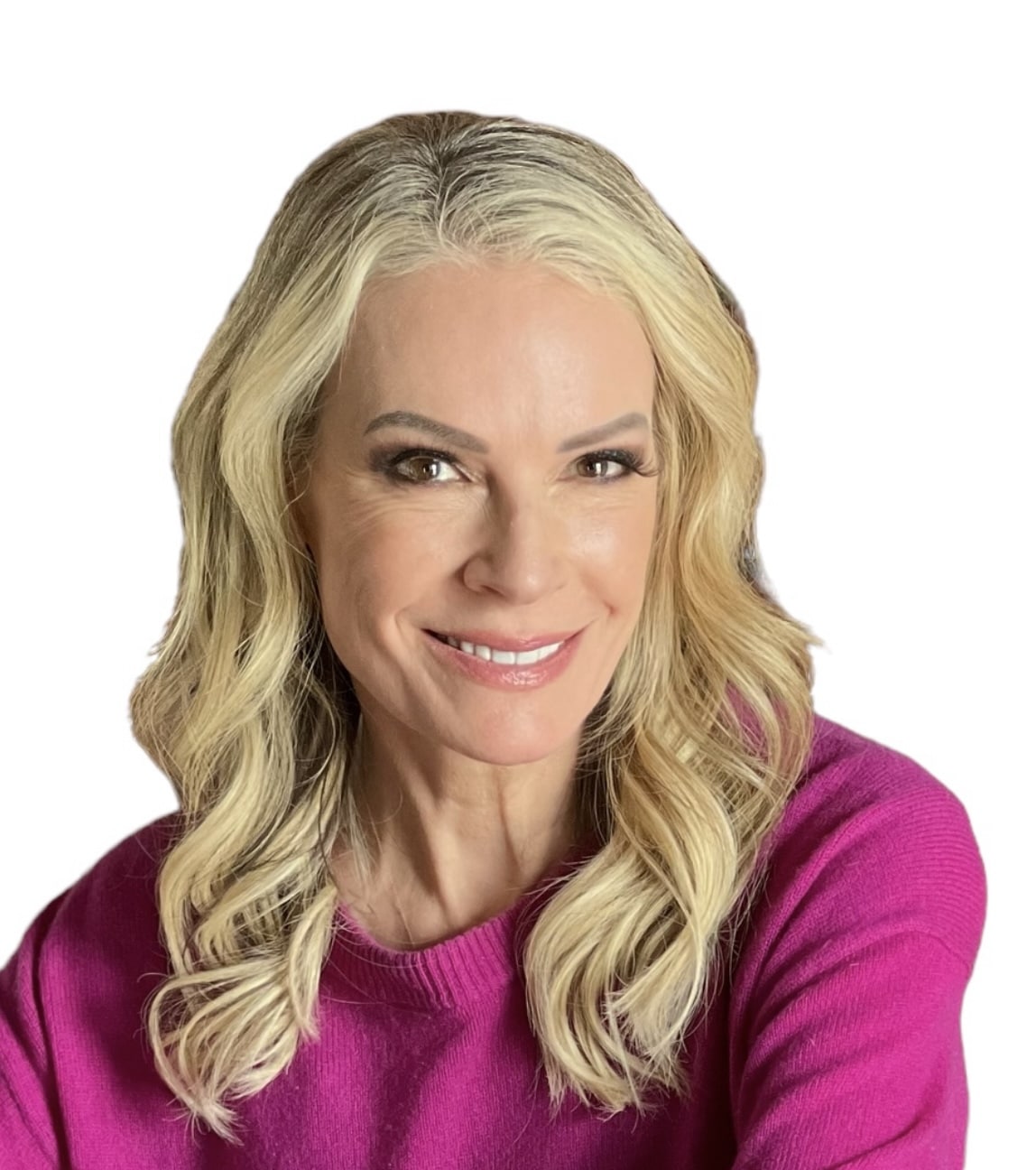
Dr. Nina Savelle-Rocklin is a psychoanalyst, author and radio host specializing in binge eating disorder. She is the author of The Binge Cure: 7 Steps to Outsmart Emotional Eating and Food for Thought: Perspectives on Eating Disorders, and co-editor of Beyond the Primal Addiction. She hosts The Dr. Nina Show radio program on LA Talk Radio.
More episodes

